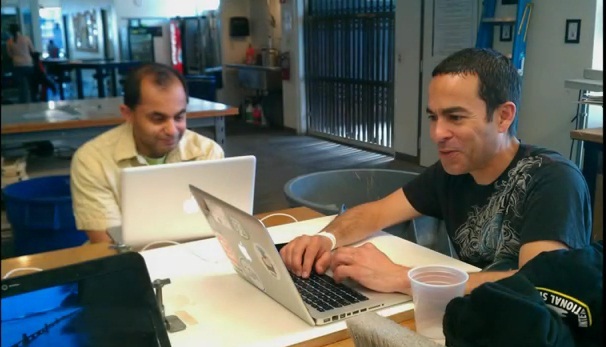Over the weekend of April 21 and 22, two engineers from the Bookshare team, Gerardo Capiel and Rom Srinivasan, participated in the International Space Apps Challenge, a two-day event designed to bring citizens from around the world together to solve challenges relevant to spatial exploration and social need. It’s a “code-a-thon” weekend – a technology development marathon – with engineers on all seven continents and in space volunteering their time, collaborating on solutions to interesting problems.

The Bookshare team contributed one of the challenges for the weekend: to continue development of MathTrax, an open source graphing application developed by NASA that plots equations, physics simulations or data files. As demonstrated in a video by Stanford student Nicole Torcolini, MathTrax is particularly helpful for students with disabilities because the graphs have descriptions and sound.
However, MathTrax has limitations. NASA hasn’t had the resources to continue to develop it, so it’s not current with HTML5 and cannot be embedded into EPUB 3, the current publishing standard for digital textbooks. Various engineers signed up to work on the challenges of MathTrax – their work will further the accessibility of graphs for individuals with visual impairments. Over the weekend, the team worked on:
- Automatically leveraging the descriptions that MathTrax creates and putting them in a browser–based environment, so readers can listen to them with a screen reader or potentially text-to-speech applications, instead of just in the MathTrax environment
- Taking the graphing capacity and images that weren’t easy to print on a tactile printer, and generating the images in a format (SVG) that will print on tactile printer. The team also started work on another format that would enable printing the images on very inexpensive 3D printer
- Lastly, the team worked on technology that would embed the MathTrax capability in ebooks, so readers could hear MathTrax’s auditory representation of the data even when user didn’t have an internet connection.
The technical descriptions of the Benetech challenges are on online; and the engineers described their work over the weekend in a video.
Around the world, 2,083 participated, working on 71 challenges and developing more than 100 unique solutions. After the weekend, Rom commented, “It was very inspiring to see people from all over the country come to San Francisco on their own dime to help contribute to solving some of the problems of the less fortunate around the world.” If you are interested in learning more about the results of the weekend, please visit the International Spaces Apps Challenge site.

Be First to Comment